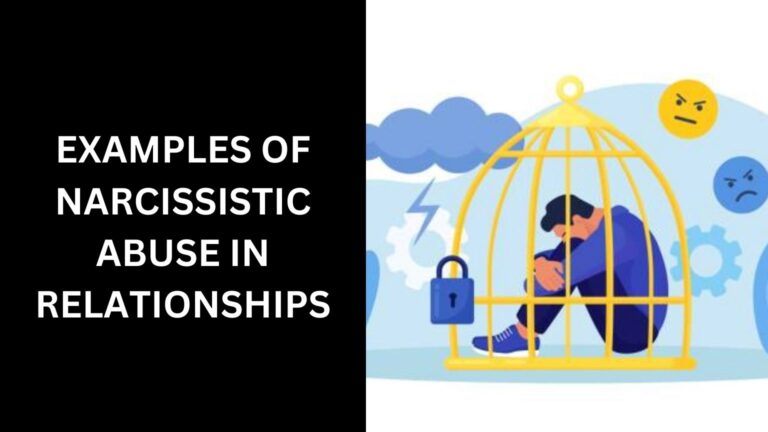Why Do Narcissist Come Back When Your Strong Again? (Guide)
Why Do Narcissist Come Back When Your Strong Again? Narcissistic relationships are often characterized by a tumultuous cycle of idealization, devaluation, and discard.
This dynamic can leave individuals emotionally drained and questioning their own worth. One common perplexity in such relationships is the tendency for narcissists to return when their victims have regained strength and independence.
This article explores the psychology behind why narcissists come back and offers insights into coping strategies.

Introduction: Understanding Narcissism
Narcissism is a personality disorder characterized by a grandiose sense of self-importance, a need for excessive admiration, and a lack of empathy for others.
Individuals with narcissistic personality disorder (NPD) often exhibit manipulative and exploitative behaviors in relationships.
Definition of Narcissism
Narcissism stems from Greek mythology, where Narcissus fell in love with his own reflection. In psychology, it refers to an inflated self-image and a constant craving for validation.
Characteristics of Narcissistic Personality
- Grandiosity
- Lack of empathy
- Sense of entitlement
- Manipulative tendencies
Why Do Narcissist Come Back When Your Strong Again?
Narcissists may come back when you’re strong again because they thrive on power and control.
Your strength threatens their sense of dominance, so they may attempt to regain control and manipulate you back into their orbit. They often see relationships as a game of power rather than a genuine connection.
The Cycle of Narcissistic Relationships
The cycle of narcissistic relationships is a complex and often tumultuous pattern that characterizes interactions between narcissists and their partners.
Understanding this cycle is crucial for individuals who may find themselves entangled in such dynamics. Here’s a detailed exploration of the cycle of narcissistic relationships:
Idealization Phase
The cycle typically begins with the idealization phase, where the narcissist portrays themselves as charming, attentive, and deeply interested in their partner.
They may shower their partner with affection, compliments, and gifts, creating an illusion of a perfect relationship.
During this phase, the partner feels valued, cherished, and emotionally connected to the narcissist.
Devaluation Phase
As the relationship progresses, cracks start to appear in the facade of perfection. The narcissist’s true nature begins to surface, revealing traits such as manipulation, selfishness, and a lack of empathy.
In the devaluation phase, the narcissist may start to criticize, belittle, or devalue their partner.
They may use subtle or overt tactics to undermine their partner’s confidence, control their behavior, or create feelings of inadequacy.
The devaluation phase can be emotionally devastating for the partner, as they experience a sudden shift from being idealized to being devalued.
This phase is characterized by emotional highs and lows, confusion, and a sense of walking on eggshells to avoid triggering the narcissist’s anger or disapproval.
Discard Phase
Eventually, the cycle moves into the discard phase, where the narcissist may abruptly end the relationship or withdraw emotionally and physically.
This phase often leaves the partner feeling abandoned, rejected, and emotionally wounded.
The narcissist may discard their partner callously, without empathy or regard for the emotional impact.
The discard phase can be particularly traumatic, as the partner struggles to make sense of the sudden rejection and loss.
They may experience a range of emotions, including grief, anger, betrayal, and self-doubt.
The abruptness of the discard can shatter the partner’s sense of identity and leave them questioning their worth and value in the relationship.
Hoovering or Reconciliation Attempts
After the discard phase, some narcissists may engage in hoovering, which involves attempts to reel their partner back into the relationship.
Hoovering can take various forms, such as apologies, promises of change, or grand gestures designed to manipulate the partner’s emotions.
Hoovering can be confusing for the partner, as it may give the false impression that the narcissist has changed or genuinely cares about the relationship.
However, hoovering is often a tactic used by narcissists to regain control, alleviate boredom, or satisfy their egoic needs. It is not a sincere attempt at reconciliation or personal growth.
The Cycle Repeats
If the partner succumbs to hoovering and re-enters the relationship, the cycle of idealization, devaluation, and discard is likely to repeat.
This cyclical pattern can continue indefinitely unless the partner recognizes the toxic dynamics, sets boundaries, and seeks support to break free from the cycle.
Why Narcissists Return?

Narcissists often exhibit a puzzling behavior of returning to their former partners, especially when the partners have regained strength or independence.
This phenomenon can be attributed to several psychological factors:
1. Lack of Closure
Narcissists may return because the previous relationship lacked closure. They may feel unresolved emotions or unfinished business, leading them to seek contact with their former partners to gain a sense of closure or validation.
2. Need for Control
Narcissists thrive on control and manipulation. Returning to a previous partner allows them to regain a sense of power and dominance. They may seek to reassert control over their partner’s emotions, actions, or decisions.
3. Ego Boost
Being rejected or discarded can bruise a narcissist’s ego. Returning to a former partner who has become stronger or successful can provide an ego boost and reaffirm their self-image as desirable and influential.
4. Familiarity and Comfort
Narcissists may return to familiar relationships because they offer a sense of comfort, stability, and familiarity. They may struggle to form new connections or find satisfaction outside of previous relationships.
5. Narcissistic Supply
Narcissists crave attention, admiration, and validation, known as narcissistic supply. Returning to a former partner allows them to fulfill their need for attention and control the narrative of the relationship.
6. Idealization of the Past
Narcissists often idealize the past, especially the initial stages of a relationship characterized by intense passion, admiration, and adoration.
They may romanticize the past and believe that rekindling the relationship will recreate those feelings.
7. Manipulative Intentions
Returning to a former partner can be a strategic move for narcissists. They may use love bombing, manipulation tactics, or false promises of change to regain control, extract resources, or fulfill their own agenda.
What Happens When They Return?
When narcissists return to their former partners, several behavioral patterns and dynamics often unfold.
These actions can be manipulative, emotionally charged, and designed to regain control over the relationship. Here’s what typically happens when narcissists return:
1. Love Bombing
One common tactic employed by narcissists upon their return is love bombing. This involves showering their partner with excessive affection, attention, compliments, and gifts.
The goal is to overwhelm the partner with positive reinforcement and create an illusion of intense emotional connection and intimacy.
2. Manipulation Tactics
Narcissists may resort to various manipulation tactics to regain control and influence over their partner.
These tactics can include gaslighting (distorting reality to make the partner doubt their perceptions), guilt-tripping (using guilt to manipulate behavior), playing the victim (seeking sympathy and deflecting responsibility), or using emotional blackmail.
3. Gaslighting
Gaslighting is a particularly insidious tactic used by narcissists. It involves systematically undermining the partner’s perception of reality, memory, and experiences.
By distorting facts, denying previous statements or actions, and creating confusion, gaslighting can make the partner doubt their sanity and feel powerless.
4. Reestablishing Dominance
Returning narcissists often seek to reestablish dominance and control over the relationship.
They may impose their preferences, dictate terms, and expect compliance from their partner. This can lead to a power imbalance and erode the partner’s autonomy and self-esteem.
5. Testing Boundaries
Narcissists may test their partner’s boundaries upon their return. They may push limits, violate personal space, or engage in behaviors that previously caused distress.
Testing boundaries allows narcissists to gauge their partner’s reactions and assert control.
6. Emotional Manipulation
Emotional manipulation is a hallmark of narcissistic behavior. Upon returning, narcissists may use emotional manipulation to evoke specific responses from their partner, such as guilt, pity, admiration, or affection. This manipulation serves their agenda and reinforces their sense of superiority.
7. Repeating Patterns
The return of a narcissist often leads to a repetition of familiar relationship patterns, including idealization, devaluation, and discard.
The cycle may continue unless the partner establishes firm boundaries, seeks support, and recognizes the toxic dynamics at play.
Coping Strategies
Coping with the return of a narcissist can be challenging, but there are effective strategies to navigate this situation and protect your well-being. Here are some coping strategies to consider:
Setting Boundaries
Establishing clear boundaries is crucial when dealing with narcissists. This includes limiting contact, avoiding emotional triggers, and prioritizing self-care.
Seeking Support
Talking to a therapist or joining support groups can provide validation, guidance, and emotional support during difficult times.
Self-Care Practices
Engaging in self-care activities such as exercise, meditation, and creative outlets can help individuals rebuild their self-esteem and resilience.
People also ask
What makes a narcissist come back to you?
Narcissists often come back to former partners due to a combination of factors like a lack of closure, the need for control, ego validation, familiarity, and the desire for narcissistic supply.
What attracts a narcissist back?
Narcissists are often attracted back to former partners by the prospect of regaining control, fulfilling their ego needs, reestablishing familiarity, and obtaining a source of narcissistic supply.
What is it called when a narcissist comes back?
When a narcissist returns to a former partner, it’s often referred to as hoovering or a hoovering attempt.
Why does the narcissist keep leaving and coming back?
Narcissists may leave and come back due to a cycle of idealization, devaluation, and discard, seeking control,
validation, and ego gratification in repeated patterns of manipulation and emotional rollercoasters.
Conclusion
In Conclusion, Understanding why narcissists come back when you’re strong again involves delving into their need for control, ego validation, and manipulative tendencies.
By recognizing these patterns and implementing healthy coping strategies, individuals can break free from toxic cycles and prioritize their emotional well-being.






